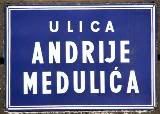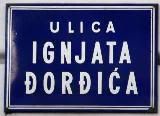Check in Easy Croatian: 20 At My Friend's: Genitive, 44 Genitive Plural
The Genitive Case Introduced
Now we are hitting some hard stuff. It's finally time to introduce one more case: the genitive (abbreviation: gen.). What is it used for? Well, for many things. Most important, in phrases "x of y", and for counting and measuring. Let's take a look at genitive endings for nouns:
case ma-nouns mi-nouns n-nouns a-nouns i-nouns nom.sg. - - -œ -a - acc.sg. -a -u dat.sg. -u (+)i -i gen.sg. -a -e -i nom.pl. -[œv]+i -a -e -i acc.pl. -[œv]e dat.pl. -[œv]+ima -ima -ama -ima gen.pl. -[œv]a -a -a (-i) -i
Here I have used the "o/e notation" (symbol œ) for "o that depends on the preceding sound". Note how neuter nouns in nominative actually can have either -o or -e and that is precisely that kind of o.
Endings of Genitive Plural
However, now it gets, well, complicated. First, there are few nouns that have -iju or -u in gen.pl.:
gost mª "guest" → gostiju
oči f pl. "eyes" → očiju
ruka f "arm, hand" → rukuuši f pl. "ears" → ušiju
noga f "leg" → nogu
Second, some nouns have a "lengthened" gen.pl., usually inserting some additional -a- "from nowhere". If nom.sg. has an ä that is "lost" in other cases, in gen.pl. it reappears. For instance:
[UNDER CONSTRUCTION]
noun (nom.sg.) nom.pl. gen.pl. magaräc mª "donkey" magarci magaräca muškaräc mª "man, male" muškarci muškaräca pismo n "letter" pisma pisäma
djëvojka "girl" → djëvojäka
ovca "sheep" → oväca
sestra "sister" → sestära
zemlja "earth, country" → zemälja
Third, there are a-nouns that end on -i in gen.pl. Usually, such nouns end on -ka in nom.sg; some of them can have the "lengthened" form as well. All of them have a "consonant cluster" before the final -a:
Fourth, some m-nouns have gen.pl. on -i:
ljudi mª pl. "men, people" (used as plural of čovjëk) → ljudi
mjësec mi "month, moon" → mjëseci
sat mi "hour" → sati
I will always, in vocabulary lists, write gen.pl. for every word that has something else from the default -a.
The lengthened forms are considered archaic and provincial by some people, and people tend to use forms on -i if words have both options. The lengthening by inserting ä can appear only if a word would have two consecutive consonants different from st, št, zd, žd (like pismo gen.pl. pisäma, but not mjësto)
Adjectives
Forms for adjectives follow:
case ma mi n f nom.sg. -, -i -, -i -œ -a acc.sg. -œg(a) -u dat.sg. -œm(u), -ome -oj gen.sg. -œg(a) -e nom.pl. -i -a -e acc.pl. -e dat.pl. -im gen.pl. -ih
As you can see, it's much simpler than endings for nouns. However, the endings for adjectives are unlike ones for nouns!
Belonging
The genitive is (among other uses) used to make noun phrases of type "X of Y". For instance, phrase "return of the king" translates as:
povratak kralja nom.sg. gen.sg. return king
We could rephrase it as "king's return":
kraljev povratak
However, in Croatian, you can make possesive adjectives of single words only! In English, you can say "my sister's car", but in Croatian you must effectively rephrase it as "the car of my sister". Another example, phrase "owner of the yellow house" cannot be rephrased. It must be translated to Croatian by placing the subphrase žuta kuća "yellow house" in genitive — both the adjective and noun must be put in that case:
vlasnik žute kuće nom.sg. gen.sg.f gen.sg. owner yellow house
Structure of such phrases is like this: N NP.gen.
Noun at the front (vlasnik in our example, also called the "head noun") remains "unlocked", and should be put in appropriate case according to the role in a sentence, while the rest is "permanently locked" in the genitive. To illustrate this, let's use vlasnik žute kuće in various roles in sentence:
Vlasnik žute kuće je došao. "The owner of the yellow house came." (vlasnik is nom.sg.)
Pitam vlasnika žute kuće. "I am asking the owner of the yellow house." (vlasnika is acc.sg.)
Dajem ključeve vlasniku žute kuće. "I am giving the keys to the owner of the yellow house." (vlasniku is dat.sg.)
Etc. You see that žute kuće is simply "attached" to the noun and never changes its case or anything else. The phrase in plural is:
Vlasnici žute kuće "owners of the yellow house"
We can put an adjective phrase before the head noun, for instance:
Novi vlasnik žute kuće "new owner of the yellow house"
One use of genitive is that something belongs to someone. It's used to say that a street or square is named after someone. So, in Croatian, we say "Street of X", or "Square of Y" which translates to ulica X-gen and trg Y-gen. For instance, consider these three plates:



The square (trg) is named after Franklin Roosevelt (literally, it's "his" square, it "belongs to him"), and streets after two local guys, Andrija Medulić and Ignjat Đorđić. There's another way to express that something belongs to someone (e.g. "king's return", see above), and hence the street names — about it a bit later.
Another Way to Remember Endings
Here's another way to look at the endings, you can remember both adjectives and nouns for each gender:
number nouns nom. gen. sg. m- velik(i) konj
velik(i) magaräc
velik(i) kolačvelikog(a) konja
velikog(a) magarca
velikog(a) kolačan- veliko selo
veliko pismo
veliko morevelikog(a) sela
velikog(a) pisma
velikog(a) moraa- velika kuća velike kuće i- velika stvar velike stvari pl. m- veliki konji
veliki magarci
veliki kolačivelikih konja
velikih magaräca
velikih kolačan- velika sela
velika pisma
velika moravelikih sela
velikih pisäma
velikih moraa- velike kuće velikih kuća i- velike stvari velikih stvari
Further Uses
Genitive is used with some verbs, with many prepositions (words like "without", "from", in some other instances, etc. — in fact, genitive is almost the "default" case when noun is neither a subject or object of action but is used in another construct. One of the main uses is to measure and count things, as you will see soon.
Updated 2013-06-08
10 comments:
Hi Daniel,
As an Englishman now living in Croatia for 8 months, I've been struggling with the language despite having several books. I'd like to reinforce the rest of the comments on how good this site is.
At the top of this page you mention "6 genders" when I think you mean "6 cases"?
On the what would help topic - how about a legend or glossary summary page? You've introduced your own language/labeling system (which is great), but it contains a lot of content so a single page with all of the +, -. oe, M(a), M(i), ....etc. etc would be a real plus in my opinion.
Puno hvala!
Martin.
Hello Daniel,
Just a note to say that this is an excellent resource. Thank you for making it available.
Best Regards,
Jineu
Thanks for the kind words, you are welcome!! Please point out any inconsistencies or errors... br Daniel
Hello Daniel,
Do you know of any good on-line dictionaries that tell what gender a Croatian word belongs to? (Preferably an English-Croatian dictionary, but I know this may be hard to find!). Some are quite obvious, but others I find to be tricky and I'm just looking for a resource to be sure.
Great job with the blog!
The best online dictionary is Croatian Language Portal, there's a search box on the left, e.g. you type noć and you'll get:
nȏć ž 〈G nȍći, I nȍći/nȍću, G mn nòćī〉
ž = ženski "feminine".
http://hjp.novi-liber.hr/index.php?show=search_by_id&id=eF1vWRU%3D&keyword=no%C4%87
Unfortunately, most online English-Croatian dictionaries are just toys. They don't give verb aspect, declension, gender, comparative form of adjectives etc. I'm not aware of a good online Croatian-English dictionary :(
Thanks, please suggest any improvements....
br Daniel
Thank you very much Daniel!
Why is there a street name Franklin Roosevelt in Croatia?
Just wanted to point out to anyone interested that Wiktionary has on it's english site information about most Croatian words including declensions (just scroll to that section if the word exists in more languages), and what is missing can be found on the croatian site of the same (but then the explaination of the word might be harder to understand, but declension will still be available).
Example for the words "žena" and "riječ":
http://en.wiktionary.org/wiki/žena
http://en.wiktionary.org/wiki/riječ
Wow! Thanks so much, Max. There certainly is a wealth of information here.
Post a Comment